Nursing Ethics Issues 2022
VerifiedAdded on 2022/09/26
|10
|2759
|32
AI Summary
Contribute Materials
Your contribution can guide someone’s learning journey. Share your
documents today.
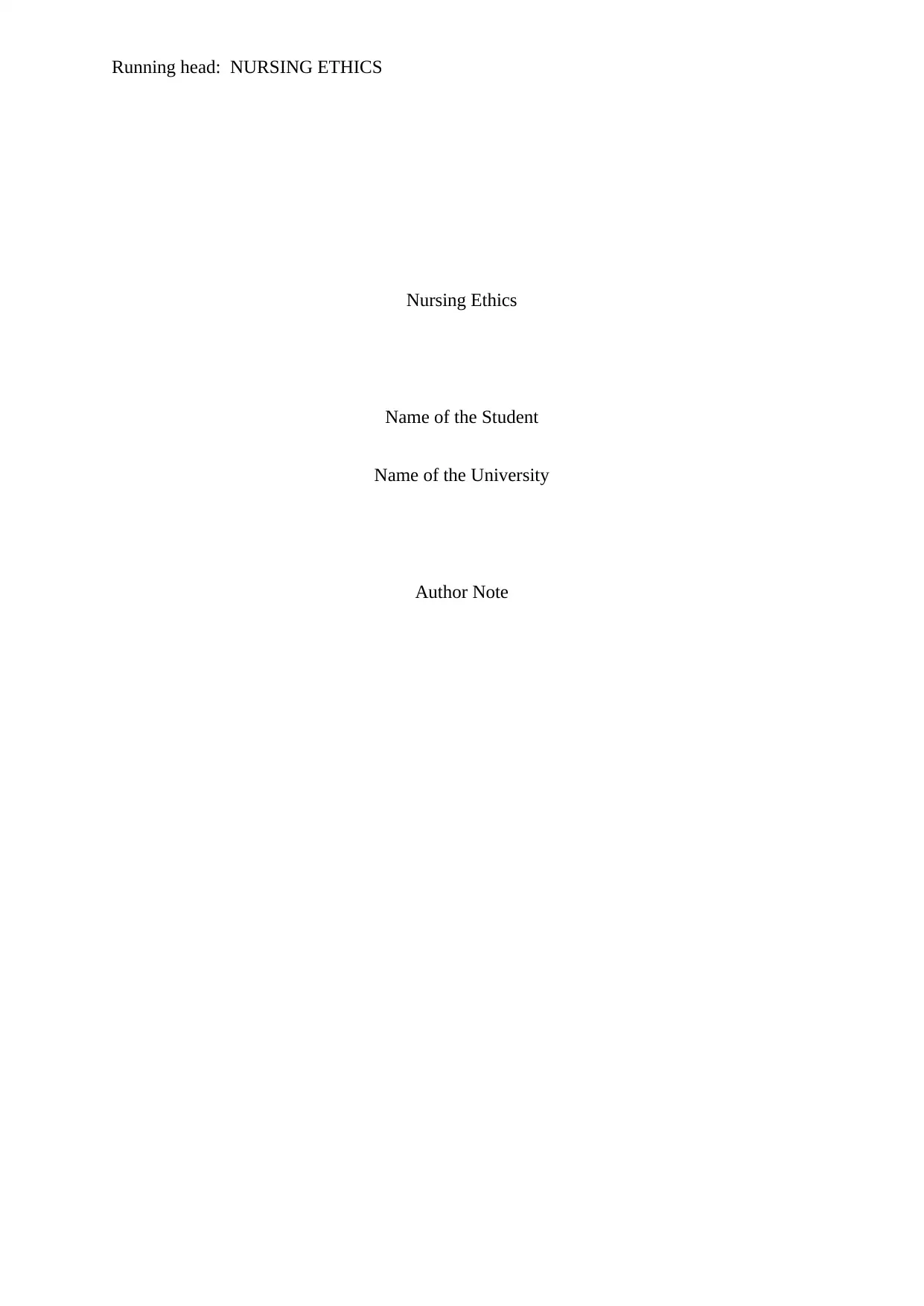
Running head: NURSING ETHICS
Nursing Ethics
Name of the Student
Name of the University
Author Note
Nursing Ethics
Name of the Student
Name of the University
Author Note
Secure Best Marks with AI Grader
Need help grading? Try our AI Grader for instant feedback on your assignments.
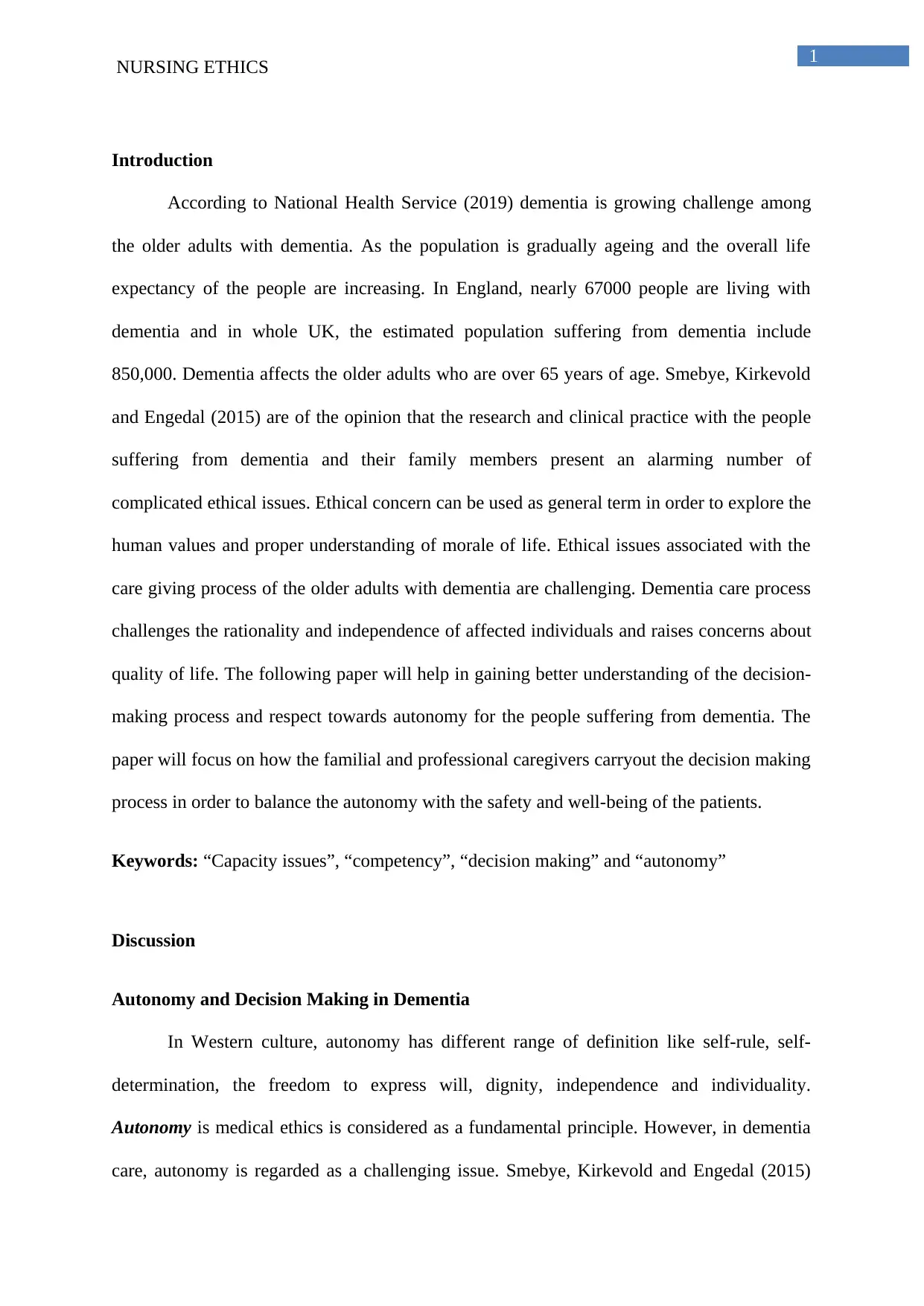
1
NURSING ETHICS
Introduction
According to National Health Service (2019) dementia is growing challenge among
the older adults with dementia. As the population is gradually ageing and the overall life
expectancy of the people are increasing. In England, nearly 67000 people are living with
dementia and in whole UK, the estimated population suffering from dementia include
850,000. Dementia affects the older adults who are over 65 years of age. Smebye, Kirkevold
and Engedal (2015) are of the opinion that the research and clinical practice with the people
suffering from dementia and their family members present an alarming number of
complicated ethical issues. Ethical concern can be used as general term in order to explore the
human values and proper understanding of morale of life. Ethical issues associated with the
care giving process of the older adults with dementia are challenging. Dementia care process
challenges the rationality and independence of affected individuals and raises concerns about
quality of life. The following paper will help in gaining better understanding of the decision-
making process and respect towards autonomy for the people suffering from dementia. The
paper will focus on how the familial and professional caregivers carryout the decision making
process in order to balance the autonomy with the safety and well-being of the patients.
Keywords: “Capacity issues”, “competency”, “decision making” and “autonomy”
Discussion
Autonomy and Decision Making in Dementia
In Western culture, autonomy has different range of definition like self-rule, self-
determination, the freedom to express will, dignity, independence and individuality.
Autonomy is medical ethics is considered as a fundamental principle. However, in dementia
care, autonomy is regarded as a challenging issue. Smebye, Kirkevold and Engedal (2015)
NURSING ETHICS
Introduction
According to National Health Service (2019) dementia is growing challenge among
the older adults with dementia. As the population is gradually ageing and the overall life
expectancy of the people are increasing. In England, nearly 67000 people are living with
dementia and in whole UK, the estimated population suffering from dementia include
850,000. Dementia affects the older adults who are over 65 years of age. Smebye, Kirkevold
and Engedal (2015) are of the opinion that the research and clinical practice with the people
suffering from dementia and their family members present an alarming number of
complicated ethical issues. Ethical concern can be used as general term in order to explore the
human values and proper understanding of morale of life. Ethical issues associated with the
care giving process of the older adults with dementia are challenging. Dementia care process
challenges the rationality and independence of affected individuals and raises concerns about
quality of life. The following paper will help in gaining better understanding of the decision-
making process and respect towards autonomy for the people suffering from dementia. The
paper will focus on how the familial and professional caregivers carryout the decision making
process in order to balance the autonomy with the safety and well-being of the patients.
Keywords: “Capacity issues”, “competency”, “decision making” and “autonomy”
Discussion
Autonomy and Decision Making in Dementia
In Western culture, autonomy has different range of definition like self-rule, self-
determination, the freedom to express will, dignity, independence and individuality.
Autonomy is medical ethics is considered as a fundamental principle. However, in dementia
care, autonomy is regarded as a challenging issue. Smebye, Kirkevold and Engedal (2015)
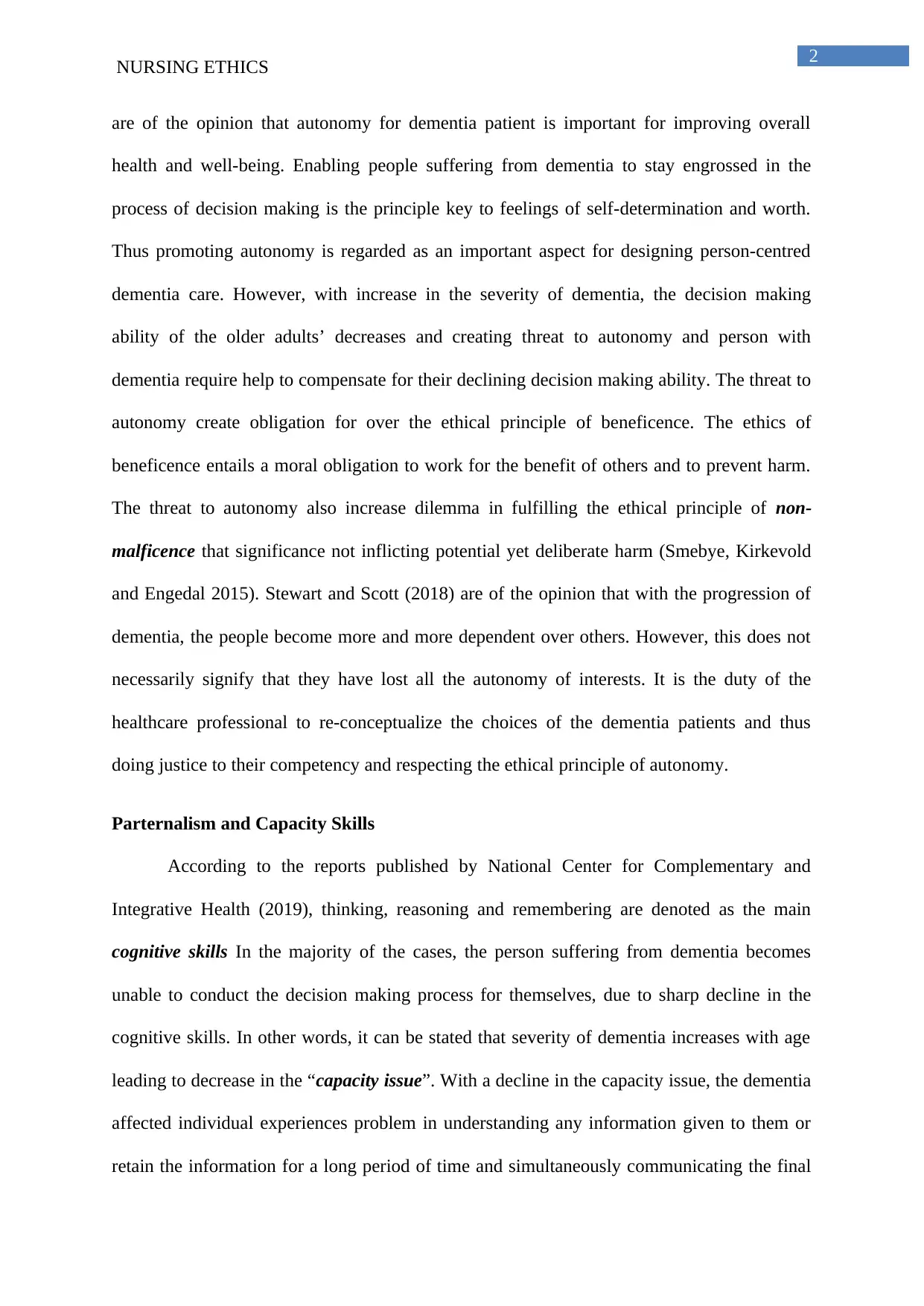
2
NURSING ETHICS
are of the opinion that autonomy for dementia patient is important for improving overall
health and well-being. Enabling people suffering from dementia to stay engrossed in the
process of decision making is the principle key to feelings of self-determination and worth.
Thus promoting autonomy is regarded as an important aspect for designing person-centred
dementia care. However, with increase in the severity of dementia, the decision making
ability of the older adults’ decreases and creating threat to autonomy and person with
dementia require help to compensate for their declining decision making ability. The threat to
autonomy create obligation for over the ethical principle of beneficence. The ethics of
beneficence entails a moral obligation to work for the benefit of others and to prevent harm.
The threat to autonomy also increase dilemma in fulfilling the ethical principle of non-
malficence that significance not inflicting potential yet deliberate harm (Smebye, Kirkevold
and Engedal 2015). Stewart and Scott (2018) are of the opinion that with the progression of
dementia, the people become more and more dependent over others. However, this does not
necessarily signify that they have lost all the autonomy of interests. It is the duty of the
healthcare professional to re-conceptualize the choices of the dementia patients and thus
doing justice to their competency and respecting the ethical principle of autonomy.
Parternalism and Capacity Skills
According to the reports published by National Center for Complementary and
Integrative Health (2019), thinking, reasoning and remembering are denoted as the main
cognitive skills In the majority of the cases, the person suffering from dementia becomes
unable to conduct the decision making process for themselves, due to sharp decline in the
cognitive skills. In other words, it can be stated that severity of dementia increases with age
leading to decrease in the “capacity issue”. With a decline in the capacity issue, the dementia
affected individual experiences problem in understanding any information given to them or
retain the information for a long period of time and simultaneously communicating the final
NURSING ETHICS
are of the opinion that autonomy for dementia patient is important for improving overall
health and well-being. Enabling people suffering from dementia to stay engrossed in the
process of decision making is the principle key to feelings of self-determination and worth.
Thus promoting autonomy is regarded as an important aspect for designing person-centred
dementia care. However, with increase in the severity of dementia, the decision making
ability of the older adults’ decreases and creating threat to autonomy and person with
dementia require help to compensate for their declining decision making ability. The threat to
autonomy create obligation for over the ethical principle of beneficence. The ethics of
beneficence entails a moral obligation to work for the benefit of others and to prevent harm.
The threat to autonomy also increase dilemma in fulfilling the ethical principle of non-
malficence that significance not inflicting potential yet deliberate harm (Smebye, Kirkevold
and Engedal 2015). Stewart and Scott (2018) are of the opinion that with the progression of
dementia, the people become more and more dependent over others. However, this does not
necessarily signify that they have lost all the autonomy of interests. It is the duty of the
healthcare professional to re-conceptualize the choices of the dementia patients and thus
doing justice to their competency and respecting the ethical principle of autonomy.
Parternalism and Capacity Skills
According to the reports published by National Center for Complementary and
Integrative Health (2019), thinking, reasoning and remembering are denoted as the main
cognitive skills In the majority of the cases, the person suffering from dementia becomes
unable to conduct the decision making process for themselves, due to sharp decline in the
cognitive skills. In other words, it can be stated that severity of dementia increases with age
leading to decrease in the “capacity issue”. With a decline in the capacity issue, the dementia
affected individual experiences problem in understanding any information given to them or
retain the information for a long period of time and simultaneously communicating the final
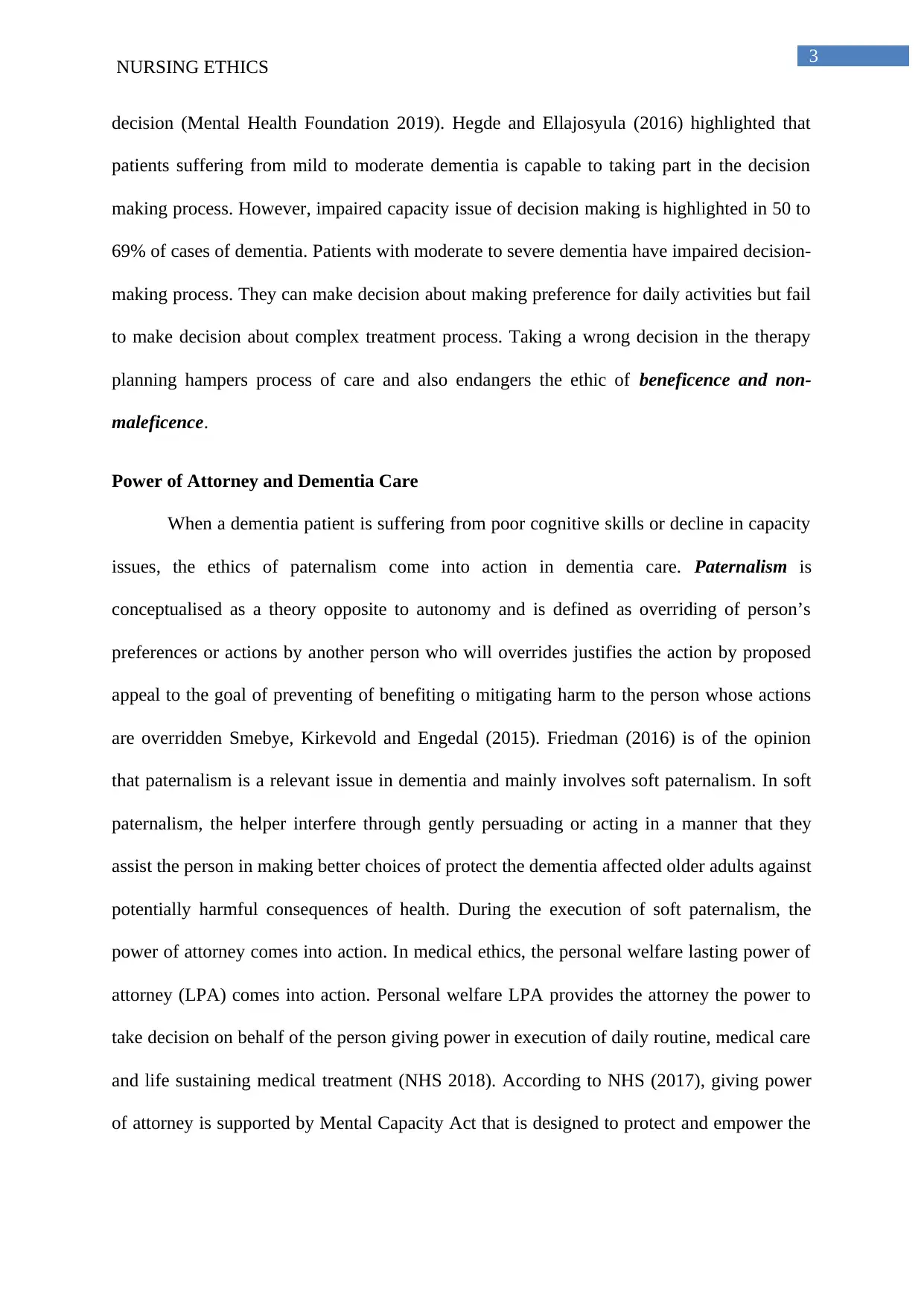
3
NURSING ETHICS
decision (Mental Health Foundation 2019). Hegde and Ellajosyula (2016) highlighted that
patients suffering from mild to moderate dementia is capable to taking part in the decision
making process. However, impaired capacity issue of decision making is highlighted in 50 to
69% of cases of dementia. Patients with moderate to severe dementia have impaired decision-
making process. They can make decision about making preference for daily activities but fail
to make decision about complex treatment process. Taking a wrong decision in the therapy
planning hampers process of care and also endangers the ethic of beneficence and non-
maleficence.
Power of Attorney and Dementia Care
When a dementia patient is suffering from poor cognitive skills or decline in capacity
issues, the ethics of paternalism come into action in dementia care. Paternalism is
conceptualised as a theory opposite to autonomy and is defined as overriding of person’s
preferences or actions by another person who will overrides justifies the action by proposed
appeal to the goal of preventing of benefiting o mitigating harm to the person whose actions
are overridden Smebye, Kirkevold and Engedal (2015). Friedman (2016) is of the opinion
that paternalism is a relevant issue in dementia and mainly involves soft paternalism. In soft
paternalism, the helper interfere through gently persuading or acting in a manner that they
assist the person in making better choices of protect the dementia affected older adults against
potentially harmful consequences of health. During the execution of soft paternalism, the
power of attorney comes into action. In medical ethics, the personal welfare lasting power of
attorney (LPA) comes into action. Personal welfare LPA provides the attorney the power to
take decision on behalf of the person giving power in execution of daily routine, medical care
and life sustaining medical treatment (NHS 2018). According to NHS (2017), giving power
of attorney is supported by Mental Capacity Act that is designed to protect and empower the
NURSING ETHICS
decision (Mental Health Foundation 2019). Hegde and Ellajosyula (2016) highlighted that
patients suffering from mild to moderate dementia is capable to taking part in the decision
making process. However, impaired capacity issue of decision making is highlighted in 50 to
69% of cases of dementia. Patients with moderate to severe dementia have impaired decision-
making process. They can make decision about making preference for daily activities but fail
to make decision about complex treatment process. Taking a wrong decision in the therapy
planning hampers process of care and also endangers the ethic of beneficence and non-
maleficence.
Power of Attorney and Dementia Care
When a dementia patient is suffering from poor cognitive skills or decline in capacity
issues, the ethics of paternalism come into action in dementia care. Paternalism is
conceptualised as a theory opposite to autonomy and is defined as overriding of person’s
preferences or actions by another person who will overrides justifies the action by proposed
appeal to the goal of preventing of benefiting o mitigating harm to the person whose actions
are overridden Smebye, Kirkevold and Engedal (2015). Friedman (2016) is of the opinion
that paternalism is a relevant issue in dementia and mainly involves soft paternalism. In soft
paternalism, the helper interfere through gently persuading or acting in a manner that they
assist the person in making better choices of protect the dementia affected older adults against
potentially harmful consequences of health. During the execution of soft paternalism, the
power of attorney comes into action. In medical ethics, the personal welfare lasting power of
attorney (LPA) comes into action. Personal welfare LPA provides the attorney the power to
take decision on behalf of the person giving power in execution of daily routine, medical care
and life sustaining medical treatment (NHS 2018). According to NHS (2017), giving power
of attorney is supported by Mental Capacity Act that is designed to protect and empower the
Secure Best Marks with AI Grader
Need help grading? Try our AI Grader for instant feedback on your assignments.
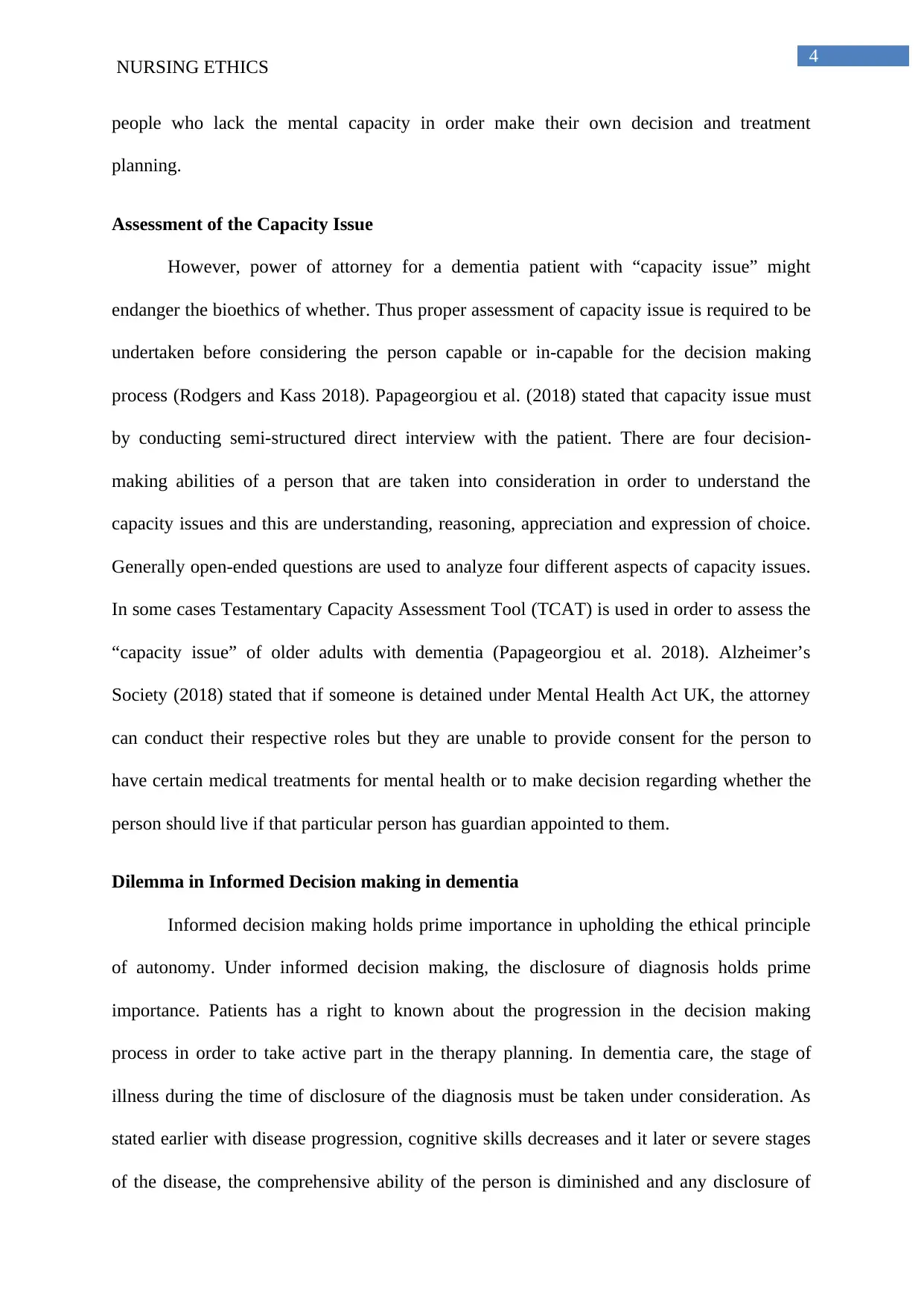
4
NURSING ETHICS
people who lack the mental capacity in order make their own decision and treatment
planning.
Assessment of the Capacity Issue
However, power of attorney for a dementia patient with “capacity issue” might
endanger the bioethics of whether. Thus proper assessment of capacity issue is required to be
undertaken before considering the person capable or in-capable for the decision making
process (Rodgers and Kass 2018). Papageorgiou et al. (2018) stated that capacity issue must
by conducting semi-structured direct interview with the patient. There are four decision-
making abilities of a person that are taken into consideration in order to understand the
capacity issues and this are understanding, reasoning, appreciation and expression of choice.
Generally open-ended questions are used to analyze four different aspects of capacity issues.
In some cases Testamentary Capacity Assessment Tool (TCAT) is used in order to assess the
“capacity issue” of older adults with dementia (Papageorgiou et al. 2018). Alzheimer’s
Society (2018) stated that if someone is detained under Mental Health Act UK, the attorney
can conduct their respective roles but they are unable to provide consent for the person to
have certain medical treatments for mental health or to make decision regarding whether the
person should live if that particular person has guardian appointed to them.
Dilemma in Informed Decision making in dementia
Informed decision making holds prime importance in upholding the ethical principle
of autonomy. Under informed decision making, the disclosure of diagnosis holds prime
importance. Patients has a right to known about the progression in the decision making
process in order to take active part in the therapy planning. In dementia care, the stage of
illness during the time of disclosure of the diagnosis must be taken under consideration. As
stated earlier with disease progression, cognitive skills decreases and it later or severe stages
of the disease, the comprehensive ability of the person is diminished and any disclosure of
NURSING ETHICS
people who lack the mental capacity in order make their own decision and treatment
planning.
Assessment of the Capacity Issue
However, power of attorney for a dementia patient with “capacity issue” might
endanger the bioethics of whether. Thus proper assessment of capacity issue is required to be
undertaken before considering the person capable or in-capable for the decision making
process (Rodgers and Kass 2018). Papageorgiou et al. (2018) stated that capacity issue must
by conducting semi-structured direct interview with the patient. There are four decision-
making abilities of a person that are taken into consideration in order to understand the
capacity issues and this are understanding, reasoning, appreciation and expression of choice.
Generally open-ended questions are used to analyze four different aspects of capacity issues.
In some cases Testamentary Capacity Assessment Tool (TCAT) is used in order to assess the
“capacity issue” of older adults with dementia (Papageorgiou et al. 2018). Alzheimer’s
Society (2018) stated that if someone is detained under Mental Health Act UK, the attorney
can conduct their respective roles but they are unable to provide consent for the person to
have certain medical treatments for mental health or to make decision regarding whether the
person should live if that particular person has guardian appointed to them.
Dilemma in Informed Decision making in dementia
Informed decision making holds prime importance in upholding the ethical principle
of autonomy. Under informed decision making, the disclosure of diagnosis holds prime
importance. Patients has a right to known about the progression in the decision making
process in order to take active part in the therapy planning. In dementia care, the stage of
illness during the time of disclosure of the diagnosis must be taken under consideration. As
stated earlier with disease progression, cognitive skills decreases and it later or severe stages
of the disease, the comprehensive ability of the person is diminished and any disclosure of
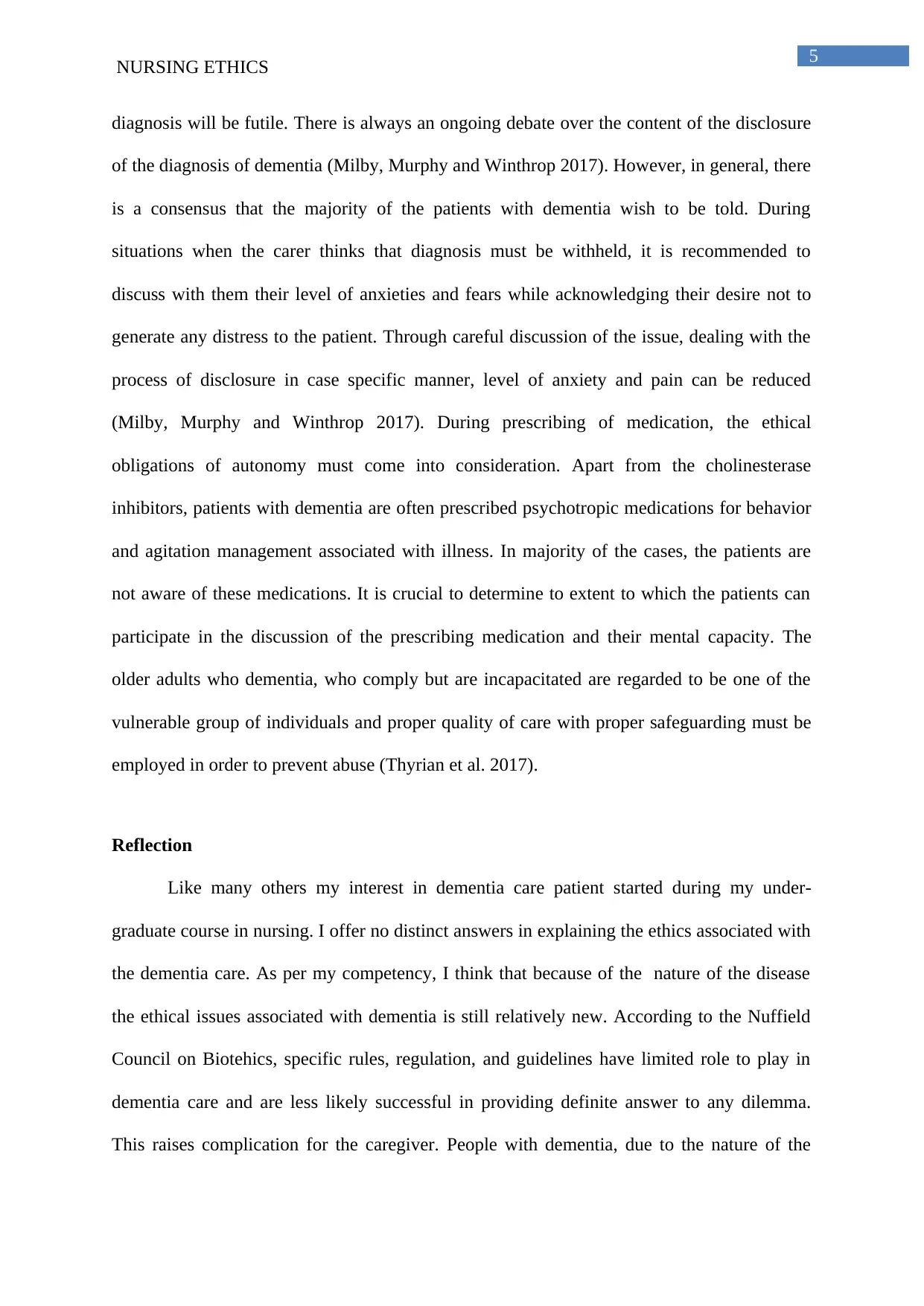
5
NURSING ETHICS
diagnosis will be futile. There is always an ongoing debate over the content of the disclosure
of the diagnosis of dementia (Milby, Murphy and Winthrop 2017). However, in general, there
is a consensus that the majority of the patients with dementia wish to be told. During
situations when the carer thinks that diagnosis must be withheld, it is recommended to
discuss with them their level of anxieties and fears while acknowledging their desire not to
generate any distress to the patient. Through careful discussion of the issue, dealing with the
process of disclosure in case specific manner, level of anxiety and pain can be reduced
(Milby, Murphy and Winthrop 2017). During prescribing of medication, the ethical
obligations of autonomy must come into consideration. Apart from the cholinesterase
inhibitors, patients with dementia are often prescribed psychotropic medications for behavior
and agitation management associated with illness. In majority of the cases, the patients are
not aware of these medications. It is crucial to determine to extent to which the patients can
participate in the discussion of the prescribing medication and their mental capacity. The
older adults who dementia, who comply but are incapacitated are regarded to be one of the
vulnerable group of individuals and proper quality of care with proper safeguarding must be
employed in order to prevent abuse (Thyrian et al. 2017).
Reflection
Like many others my interest in dementia care patient started during my under-
graduate course in nursing. I offer no distinct answers in explaining the ethics associated with
the dementia care. As per my competency, I think that because of the nature of the disease
the ethical issues associated with dementia is still relatively new. According to the Nuffield
Council on Biotehics, specific rules, regulation, and guidelines have limited role to play in
dementia care and are less likely successful in providing definite answer to any dilemma.
This raises complication for the caregiver. People with dementia, due to the nature of the
NURSING ETHICS
diagnosis will be futile. There is always an ongoing debate over the content of the disclosure
of the diagnosis of dementia (Milby, Murphy and Winthrop 2017). However, in general, there
is a consensus that the majority of the patients with dementia wish to be told. During
situations when the carer thinks that diagnosis must be withheld, it is recommended to
discuss with them their level of anxieties and fears while acknowledging their desire not to
generate any distress to the patient. Through careful discussion of the issue, dealing with the
process of disclosure in case specific manner, level of anxiety and pain can be reduced
(Milby, Murphy and Winthrop 2017). During prescribing of medication, the ethical
obligations of autonomy must come into consideration. Apart from the cholinesterase
inhibitors, patients with dementia are often prescribed psychotropic medications for behavior
and agitation management associated with illness. In majority of the cases, the patients are
not aware of these medications. It is crucial to determine to extent to which the patients can
participate in the discussion of the prescribing medication and their mental capacity. The
older adults who dementia, who comply but are incapacitated are regarded to be one of the
vulnerable group of individuals and proper quality of care with proper safeguarding must be
employed in order to prevent abuse (Thyrian et al. 2017).
Reflection
Like many others my interest in dementia care patient started during my under-
graduate course in nursing. I offer no distinct answers in explaining the ethics associated with
the dementia care. As per my competency, I think that because of the nature of the disease
the ethical issues associated with dementia is still relatively new. According to the Nuffield
Council on Biotehics, specific rules, regulation, and guidelines have limited role to play in
dementia care and are less likely successful in providing definite answer to any dilemma.
This raises complication for the caregiver. People with dementia, due to the nature of the
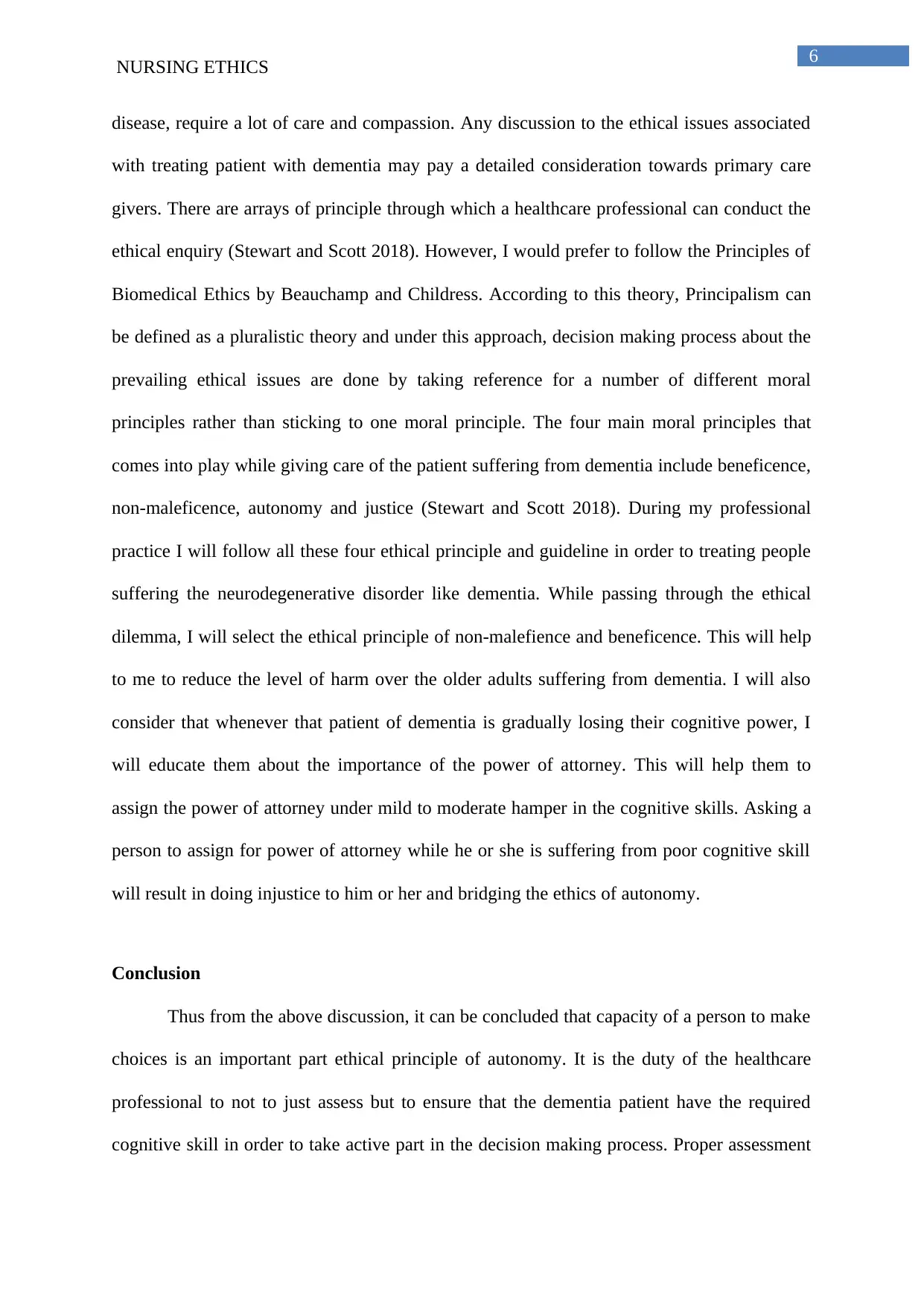
6
NURSING ETHICS
disease, require a lot of care and compassion. Any discussion to the ethical issues associated
with treating patient with dementia may pay a detailed consideration towards primary care
givers. There are arrays of principle through which a healthcare professional can conduct the
ethical enquiry (Stewart and Scott 2018). However, I would prefer to follow the Principles of
Biomedical Ethics by Beauchamp and Childress. According to this theory, Principalism can
be defined as a pluralistic theory and under this approach, decision making process about the
prevailing ethical issues are done by taking reference for a number of different moral
principles rather than sticking to one moral principle. The four main moral principles that
comes into play while giving care of the patient suffering from dementia include beneficence,
non-maleficence, autonomy and justice (Stewart and Scott 2018). During my professional
practice I will follow all these four ethical principle and guideline in order to treating people
suffering the neurodegenerative disorder like dementia. While passing through the ethical
dilemma, I will select the ethical principle of non-malefience and beneficence. This will help
to me to reduce the level of harm over the older adults suffering from dementia. I will also
consider that whenever that patient of dementia is gradually losing their cognitive power, I
will educate them about the importance of the power of attorney. This will help them to
assign the power of attorney under mild to moderate hamper in the cognitive skills. Asking a
person to assign for power of attorney while he or she is suffering from poor cognitive skill
will result in doing injustice to him or her and bridging the ethics of autonomy.
Conclusion
Thus from the above discussion, it can be concluded that capacity of a person to make
choices is an important part ethical principle of autonomy. It is the duty of the healthcare
professional to not to just assess but to ensure that the dementia patient have the required
cognitive skill in order to take active part in the decision making process. Proper assessment
NURSING ETHICS
disease, require a lot of care and compassion. Any discussion to the ethical issues associated
with treating patient with dementia may pay a detailed consideration towards primary care
givers. There are arrays of principle through which a healthcare professional can conduct the
ethical enquiry (Stewart and Scott 2018). However, I would prefer to follow the Principles of
Biomedical Ethics by Beauchamp and Childress. According to this theory, Principalism can
be defined as a pluralistic theory and under this approach, decision making process about the
prevailing ethical issues are done by taking reference for a number of different moral
principles rather than sticking to one moral principle. The four main moral principles that
comes into play while giving care of the patient suffering from dementia include beneficence,
non-maleficence, autonomy and justice (Stewart and Scott 2018). During my professional
practice I will follow all these four ethical principle and guideline in order to treating people
suffering the neurodegenerative disorder like dementia. While passing through the ethical
dilemma, I will select the ethical principle of non-malefience and beneficence. This will help
to me to reduce the level of harm over the older adults suffering from dementia. I will also
consider that whenever that patient of dementia is gradually losing their cognitive power, I
will educate them about the importance of the power of attorney. This will help them to
assign the power of attorney under mild to moderate hamper in the cognitive skills. Asking a
person to assign for power of attorney while he or she is suffering from poor cognitive skill
will result in doing injustice to him or her and bridging the ethics of autonomy.
Conclusion
Thus from the above discussion, it can be concluded that capacity of a person to make
choices is an important part ethical principle of autonomy. It is the duty of the healthcare
professional to not to just assess but to ensure that the dementia patient have the required
cognitive skill in order to take active part in the decision making process. Proper assessment
Paraphrase This Document
Need a fresh take? Get an instant paraphrase of this document with our AI Paraphraser
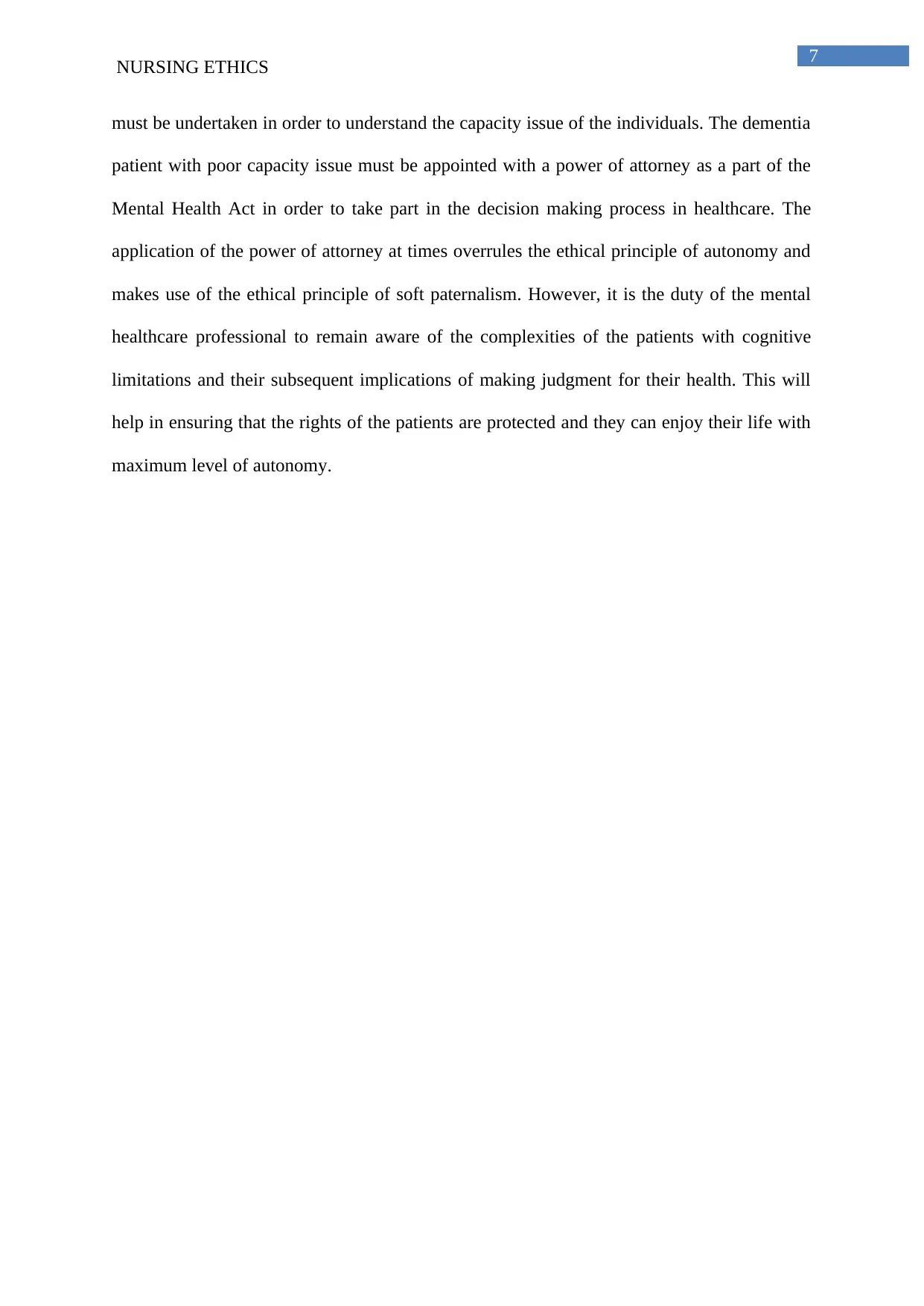
7
NURSING ETHICS
must be undertaken in order to understand the capacity issue of the individuals. The dementia
patient with poor capacity issue must be appointed with a power of attorney as a part of the
Mental Health Act in order to take part in the decision making process in healthcare. The
application of the power of attorney at times overrules the ethical principle of autonomy and
makes use of the ethical principle of soft paternalism. However, it is the duty of the mental
healthcare professional to remain aware of the complexities of the patients with cognitive
limitations and their subsequent implications of making judgment for their health. This will
help in ensuring that the rights of the patients are protected and they can enjoy their life with
maximum level of autonomy.
NURSING ETHICS
must be undertaken in order to understand the capacity issue of the individuals. The dementia
patient with poor capacity issue must be appointed with a power of attorney as a part of the
Mental Health Act in order to take part in the decision making process in healthcare. The
application of the power of attorney at times overrules the ethical principle of autonomy and
makes use of the ethical principle of soft paternalism. However, it is the duty of the mental
healthcare professional to remain aware of the complexities of the patients with cognitive
limitations and their subsequent implications of making judgment for their health. This will
help in ensuring that the rights of the patients are protected and they can enjoy their life with
maximum level of autonomy.
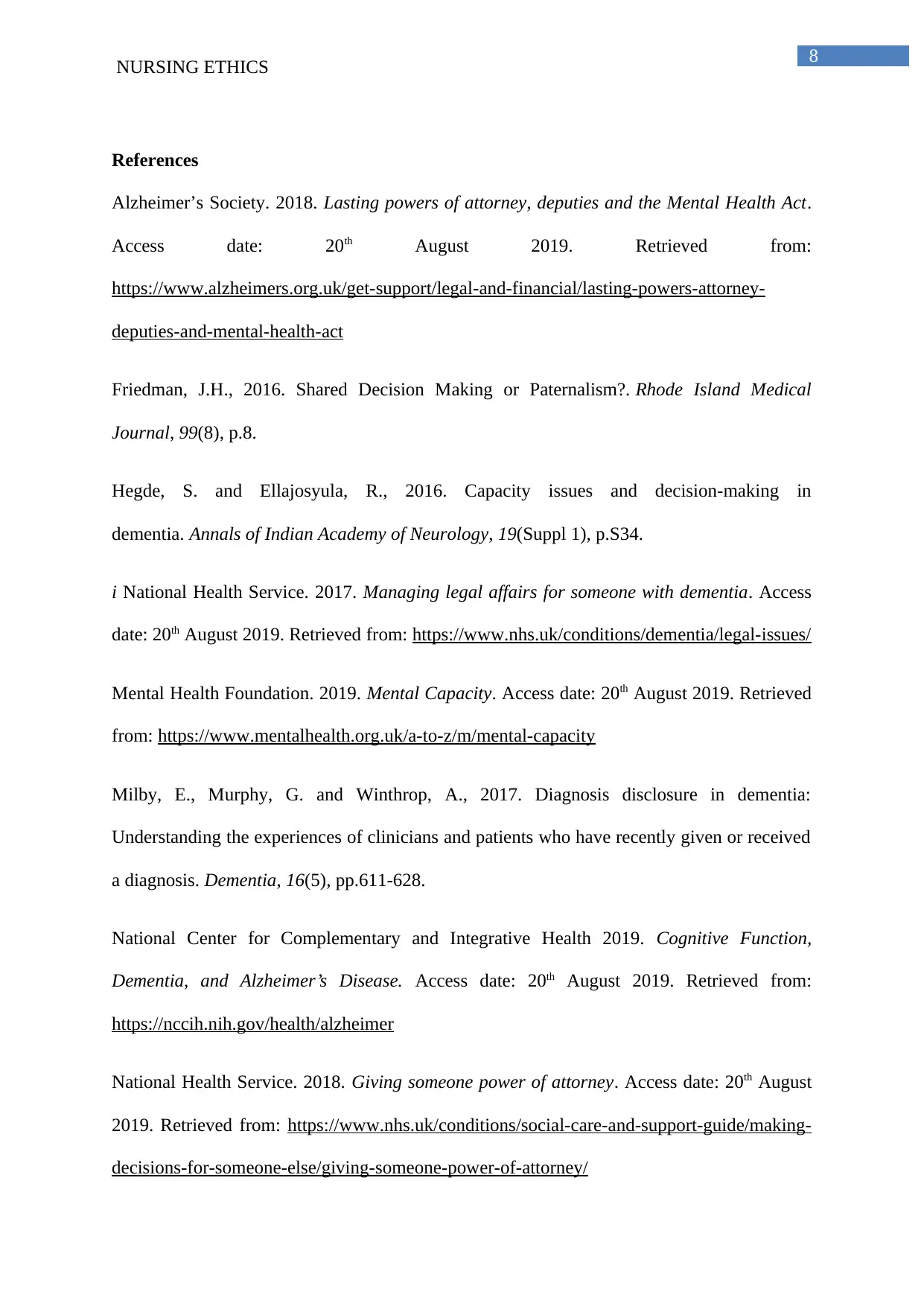
8
NURSING ETHICS
References
Alzheimer’s Society. 2018. Lasting powers of attorney, deputies and the Mental Health Act.
Access date: 20th August 2019. Retrieved from:
https://www.alzheimers.org.uk/get-support/legal-and-financial/lasting-powers-attorney-
deputies-and-mental-health-act
Friedman, J.H., 2016. Shared Decision Making or Paternalism?. Rhode Island Medical
Journal, 99(8), p.8.
Hegde, S. and Ellajosyula, R., 2016. Capacity issues and decision-making in
dementia. Annals of Indian Academy of Neurology, 19(Suppl 1), p.S34.
i National Health Service. 2017. Managing legal affairs for someone with dementia. Access
date: 20th August 2019. Retrieved from: https://www.nhs.uk/conditions/dementia/legal-issues/
Mental Health Foundation. 2019. Mental Capacity. Access date: 20th August 2019. Retrieved
from: https://www.mentalhealth.org.uk/a-to-z/m/mental-capacity
Milby, E., Murphy, G. and Winthrop, A., 2017. Diagnosis disclosure in dementia:
Understanding the experiences of clinicians and patients who have recently given or received
a diagnosis. Dementia, 16(5), pp.611-628.
National Center for Complementary and Integrative Health 2019. Cognitive Function,
Dementia, and Alzheimer’s Disease. Access date: 20th August 2019. Retrieved from:
https://nccih.nih.gov/health/alzheimer
National Health Service. 2018. Giving someone power of attorney. Access date: 20th August
2019. Retrieved from: https://www.nhs.uk/conditions/social-care-and-support-guide/making-
decisions-for-someone-else/giving-someone-power-of-attorney/
NURSING ETHICS
References
Alzheimer’s Society. 2018. Lasting powers of attorney, deputies and the Mental Health Act.
Access date: 20th August 2019. Retrieved from:
https://www.alzheimers.org.uk/get-support/legal-and-financial/lasting-powers-attorney-
deputies-and-mental-health-act
Friedman, J.H., 2016. Shared Decision Making or Paternalism?. Rhode Island Medical
Journal, 99(8), p.8.
Hegde, S. and Ellajosyula, R., 2016. Capacity issues and decision-making in
dementia. Annals of Indian Academy of Neurology, 19(Suppl 1), p.S34.
i National Health Service. 2017. Managing legal affairs for someone with dementia. Access
date: 20th August 2019. Retrieved from: https://www.nhs.uk/conditions/dementia/legal-issues/
Mental Health Foundation. 2019. Mental Capacity. Access date: 20th August 2019. Retrieved
from: https://www.mentalhealth.org.uk/a-to-z/m/mental-capacity
Milby, E., Murphy, G. and Winthrop, A., 2017. Diagnosis disclosure in dementia:
Understanding the experiences of clinicians and patients who have recently given or received
a diagnosis. Dementia, 16(5), pp.611-628.
National Center for Complementary and Integrative Health 2019. Cognitive Function,
Dementia, and Alzheimer’s Disease. Access date: 20th August 2019. Retrieved from:
https://nccih.nih.gov/health/alzheimer
National Health Service. 2018. Giving someone power of attorney. Access date: 20th August
2019. Retrieved from: https://www.nhs.uk/conditions/social-care-and-support-guide/making-
decisions-for-someone-else/giving-someone-power-of-attorney/
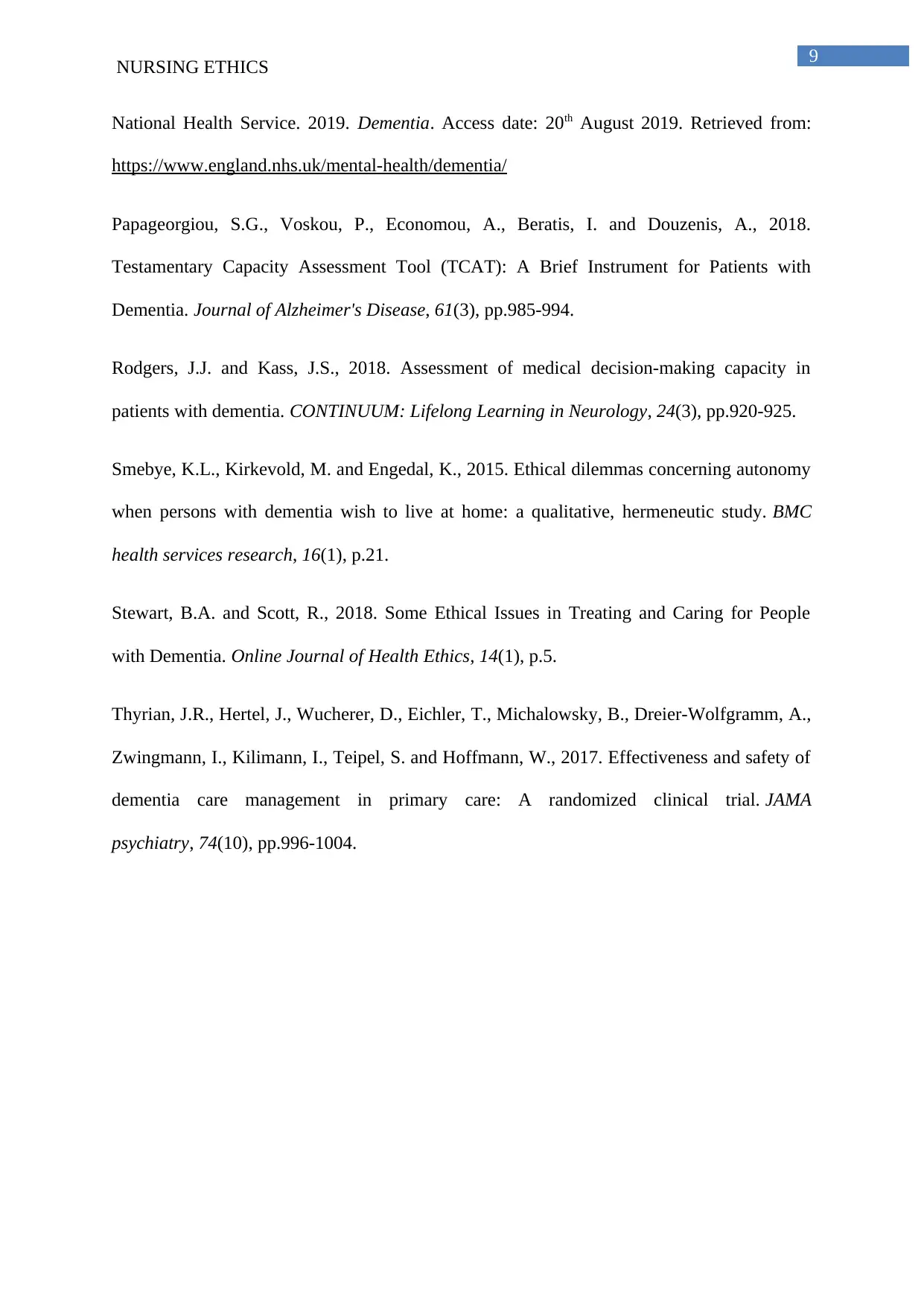
9
NURSING ETHICS
National Health Service. 2019. Dementia. Access date: 20th August 2019. Retrieved from:
https://www.england.nhs.uk/mental-health/dementia/
Papageorgiou, S.G., Voskou, P., Economou, A., Beratis, I. and Douzenis, A., 2018.
Testamentary Capacity Assessment Tool (TCAT): A Brief Instrument for Patients with
Dementia. Journal of Alzheimer's Disease, 61(3), pp.985-994.
Rodgers, J.J. and Kass, J.S., 2018. Assessment of medical decision-making capacity in
patients with dementia. CONTINUUM: Lifelong Learning in Neurology, 24(3), pp.920-925.
Smebye, K.L., Kirkevold, M. and Engedal, K., 2015. Ethical dilemmas concerning autonomy
when persons with dementia wish to live at home: a qualitative, hermeneutic study. BMC
health services research, 16(1), p.21.
Stewart, B.A. and Scott, R., 2018. Some Ethical Issues in Treating and Caring for People
with Dementia. Online Journal of Health Ethics, 14(1), p.5.
Thyrian, J.R., Hertel, J., Wucherer, D., Eichler, T., Michalowsky, B., Dreier-Wolfgramm, A.,
Zwingmann, I., Kilimann, I., Teipel, S. and Hoffmann, W., 2017. Effectiveness and safety of
dementia care management in primary care: A randomized clinical trial. JAMA
psychiatry, 74(10), pp.996-1004.
NURSING ETHICS
National Health Service. 2019. Dementia. Access date: 20th August 2019. Retrieved from:
https://www.england.nhs.uk/mental-health/dementia/
Papageorgiou, S.G., Voskou, P., Economou, A., Beratis, I. and Douzenis, A., 2018.
Testamentary Capacity Assessment Tool (TCAT): A Brief Instrument for Patients with
Dementia. Journal of Alzheimer's Disease, 61(3), pp.985-994.
Rodgers, J.J. and Kass, J.S., 2018. Assessment of medical decision-making capacity in
patients with dementia. CONTINUUM: Lifelong Learning in Neurology, 24(3), pp.920-925.
Smebye, K.L., Kirkevold, M. and Engedal, K., 2015. Ethical dilemmas concerning autonomy
when persons with dementia wish to live at home: a qualitative, hermeneutic study. BMC
health services research, 16(1), p.21.
Stewart, B.A. and Scott, R., 2018. Some Ethical Issues in Treating and Caring for People
with Dementia. Online Journal of Health Ethics, 14(1), p.5.
Thyrian, J.R., Hertel, J., Wucherer, D., Eichler, T., Michalowsky, B., Dreier-Wolfgramm, A.,
Zwingmann, I., Kilimann, I., Teipel, S. and Hoffmann, W., 2017. Effectiveness and safety of
dementia care management in primary care: A randomized clinical trial. JAMA
psychiatry, 74(10), pp.996-1004.
1 out of 10
Related Documents
Your All-in-One AI-Powered Toolkit for Academic Success.
+13062052269
info@desklib.com
Available 24*7 on WhatsApp / Email
![[object Object]](/_next/static/media/star-bottom.7253800d.svg)
Unlock your academic potential
© 2024 | Zucol Services PVT LTD | All rights reserved.





